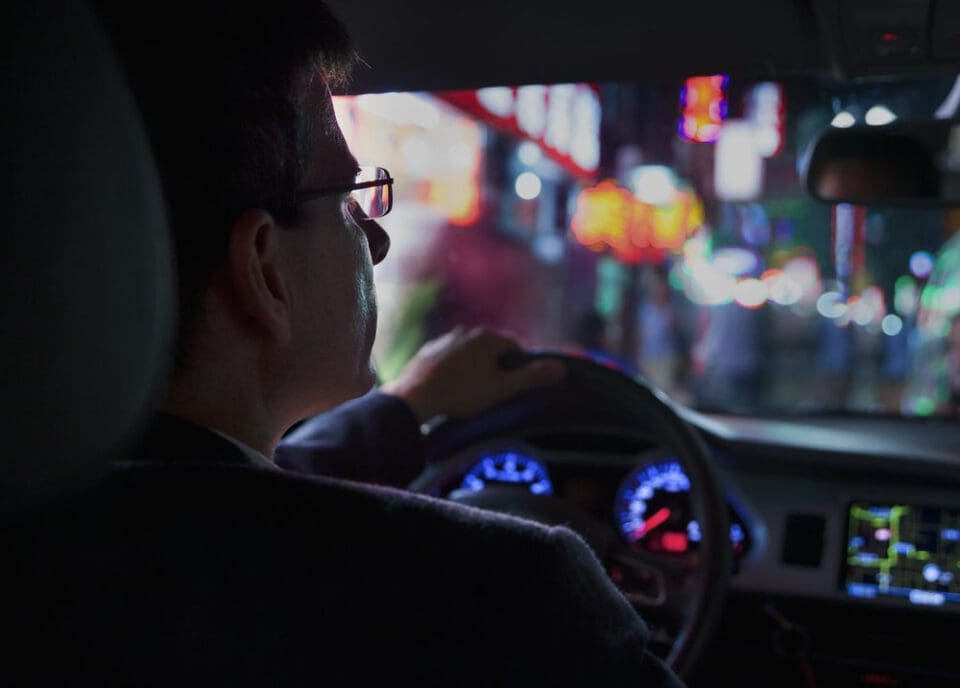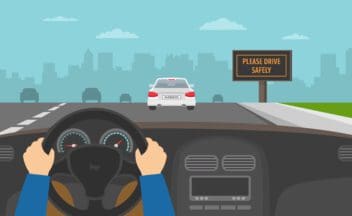Further Reading
Can Glasses Help With Night Driving? (Which Ones?)
Home / Everything About Glasses /
Last Updated:
There are many glasses marketed to help people see better at night and glasses purported to help with night driving. The optimal eyeglasses for night driving have anti-reflective (AR) coating. These glasses can let more light in and also help to reduce glare from oncoming traffic and other light sources.
Advanced technologies have designed specialized high-definition lenses that are designed to improve vision in every lighting condition, including night driving.
While often marketed specifically for night driving, polarized or UV (ultraviolet) lens glasses can actually be hazardous when used at night, as they can block too much light coming in.
There are several things you can do to enhance your vision at night in addition to specialized glasses.
Everyone’s eyes are different, and your eye care professional can help you find glasses best suited for vision clarity at all times, even driving at night.
Types of Glasses for Night Driving

Night blindness, or nyctalopia, can make it really hard for people to see in low-light conditions like nighttime. Night blindness does not mean you can’t see at all at night, just that it may be more difficult to see in dim light.
It is often a symptom or side effect of another vision issue, such as myopia (nearsightedness), the American Academy of Ophthalmology (AAO) explains. Prescription glasses can improve vision in all lighting conditions. On their own, they may improve night driving.
Adding an anti-glare, or anti-reflective (AR), coating to your eyeglasses can allow more light in and also cut down on glare. Both of these things can improve night vision and improve vision for driving at night.
Regular glasses lenses block about 8 percent of the available light, only allowing about 92 percent through to the lens. Glasses with AR coatings allow nearly all the light in, 99.5 percent, a vast difference when you are dealing with low-light situations.
Glasses with AR coating promote sharper vision. They can also appear more invisible and seem less obtrusive than regular glasses.
Glasses Designed for Driving at Night

New and advancing technologies are improving glasses regularly. New technologies involve high-definition eyeglass lenses that are specially designed to correct vision issues and higher-order aberrations.
These glasses enhance and sharpen vision in every lighting condition. As such, they can improve night vision and therefore night driving.
High-definition glasses can sharpen vision, reduce glares, and let in maximum amounts of light. Examples of high-definition eyeglass lenses include free-form and wavefront lenses.
- Free-form lenses: These lenses are highly customizable and fabricated with computer-controlled equipment. This level of technology allows them to sharpen vision-related issues that are specialized and more difficult to treat with standard lenses. They can provide some of the highest level of vision clarity during the day and at night.
- Wavefront lenses: These lenses are created with some of the same technologies used to perform wavefront-guided customized LASIK (laser-assisted in-situ keratomileusis) surgeries. These lenses are customized for each person and extremely specialized to enhance vision across all lighting fields.
High-definition and glare reducing lenses are more advanced, specialized, and typically about a quarter to twice as expensive as traditional eyeglasses.
Glasses to Avoid While Night Driving
Many glasses are marketed that claim to enhance night driving, most without a prescription. These typically include polarized or UV (ultraviolet) lenses.
These glasses are often initially designed as sunglasses meant to block out harmful sun rays and help people to see better in the sunshine. UV and polarized glasses usually have a yellow or blue tint to them. Headlights and streetlights are not the same as sunlight, however, and these glasses may actually be dangerous to wear at night.
Polarized and darkened lenses can block out too much light at night and make it harder to see. They will not just decrease glare, but they may make it even more difficult for your eyes to adjust to faraway lights or changing light conditions.
At night, your eyes need to be able to make as much use out of low light as they can. Polarized and UV lenses just serve to block the light, not enhance it.
Tips for Driving at Night

Your eye doctor can help to ensure that your prescriptions are up to date. They can help in choosing glasses and lenses that can help you to see better at all times as well as improve night driving.
There are some things you can do to improve your ability to see clearly while night driving.
- Ensure your glasses lenses are clean.
- Make sure your car headlights are working properly, free from dirt, and aligned correctly.
- Be sure your car’s windshield is clean on both sides.
- Keep your eyeglass prescription updated.
- Rest your eyes when needed. Eyestrain can decrease night vision.
Trouble driving at night can be indicative of an eye-related health issue that needs to be addressed. Talk to your eye doctor about any changes to your vision or issues with night vision and night driving.
You deserve clear vision. We can help.
With 135+ locations and over 2.5 million procedures performed, our board-certified eye surgeons deliver results you can trust. Your journey to better vision starts here.
References
- Shedding Light on Night Blindness. (September 2016). American Academy of Ophthalmology (AAO).
- Anti-Reflective Coating: See Better and Look Better. (April 2018). All About Vision.
- High-Definition Eyeglass Lenses. (August 2017). All About Vision.
- Night-Driving Glasses May Hurt Not Help. (January 2018). American Academy of Ophthalmology (AAO).
This content is for informational purposes only. It may have been reviewed by a licensed physician, but is not intended to serve as a substitute for professional medical advice. Always consult your healthcare provider with any health concerns. For more, read our Privacy Policy and Editorial Policy.